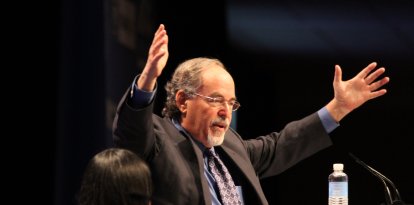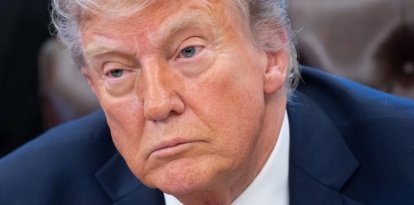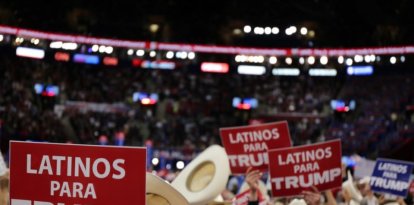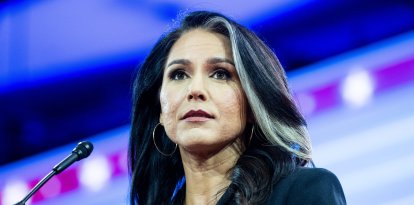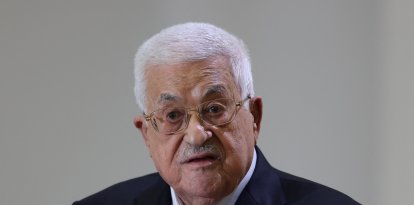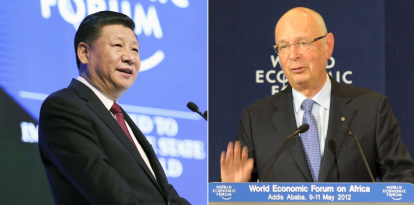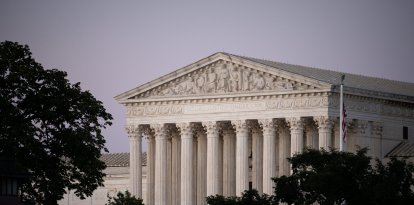Who was Trump speaking to at the Libertarian convention?
Trump is perhaps the candidate that best represents the convention's rebellious theme: "Become ungovernable." Oliver Chase continues to be a representative of the politically correct culture that has allowed and encouraged the government's increasing and excessive authoritarian actions.
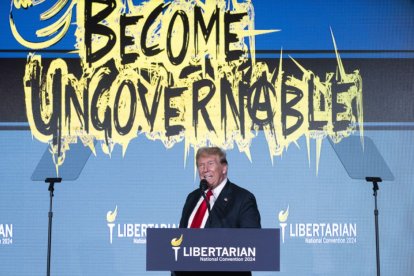
Donald Trump, the first US president to speak at the Libertarian National Convention (AFP).
Trump's speech at the Libertarian National Convention became an event of particular significance, especially for a party that, with luck, barely scratches 2% of the vote. This is, for starters, a victory for Trump. The key message that the former president was to deliver to the convention was simple: only he can give them relevance. The Trump campaign knows the leadership of the party, but it also knows that libertarian acquiescence is much more important than that represented by that small group of purist utopians, and it went to expose that discrepancy, offering a peace agreement to the silent libertarian voters. Trump presented a relevance vs. purity approach, but he did it with a performance that mixed his proverbial arrogance with a sneaky, thoughtful and surprising display of humility and skillful pragmatism.
Trump does not perfectly embody libertarian principles, but his willingness to go to a fringe convention as the candidate of one of the major parties, and put his body to the boos and discord so casually, open to hearing the insults and adapting, surely added to his popularity. He didn't leave that convention with fewer votes. He gave attendees some solid promises, a bridge to empathy and hope that they surely won't get from the nominated candidate.
In an unprecedented event, Donald Trump spoke for just over half an hour before a naturally refractory group, “ungovernable” as he calls himself, unfriendly and harboring great resentments. But he stood before them, joked, criticized, became elated and smiled. He suggested that Libertarians should join his coalition if they wanted to win, rather than settle for the "3%" of votes the party receives every four years. He also heavily emphasized the use of the word "freedom" and avoided topics of disagreement, focusing on MAGA policies that they have in common.
Shortly before, Deroy Murdock, writing for American Spectator, listed those possible common topics. The Trump campaign appears to have taken note of this argument for Trump's record as president from a libertarian philosophical perspective. Murdock highlighted Trump's tax cuts, his stance on Obamacare, his refusal to start wars abroad, his large-scale deregulation, his justice reform, etc. He worried about showing that his libertarian credentials were better than Biden's, or at least that he was the least bad.
On defense issues, Trump noted that he was the first president in decades without a new war under his command, and the one who put NATO governance under the microscope, in addition to being the one who withdrew from the nuclear deal with Iran. On energy issues he was, at his political level, the most relevant questioner of the climate agenda, removing the United States from the Paris Climate Accord, opposing subsidies for renewable energy, and supporting the free market in development of fossil fuels. He enacted record tax cuts and reduced regulations by unprecedented amounts. Again, he was not speaking for the party leaders, he wanted to seduce an important and silent minority. According to various surveys, such as one by YouGov, between 10% and 15% of Americans consider themselves libertarians, but the Libertarian Party does not have the political or financial capacity to capture that electorate. Trump, in his speech, was speaking to those people.
For its part, the Libertarian Party has experienced, like almost all American institutions, a shift towards the identity-based left that puts it in a complicated situation. The convention ended up choosing Oliver Chase as its candidate, who clearly represents this shift towards the woke ideology. Historically, the party based its platform on civil and economic freedom, but its new candidate has shifted toward other concerns, such as supporting Black Lives Matter protests and advocating for the liberticidal narrative of both COVID and the affirmative action policies of the gender agenda. With Chase as the nominee, it is very possible that Trump will take the votes of those libertarians opposed to this progressive government intervention in the affairs of private life. It remains to be seen whether Chase's nomination doesn't damage the Libertarian brand itself by corroding the same purist philosophical foundations that put him there in the first place. To start, it should be noted that 36% of the delegates voted for “none of the above” so as not to have to vote for Oliver.
Of course, there is significant friction between Trump and Libertarians, and it is understandable. Two main issues put distance between both sides: open borders and free trade. But there is also, and with good reason, another resentment: Libertarians remember Trump's pandemic policies, one of the former president's biggest mistakes. Trump's speech was clever in that sense, as he sought to expose the complex web of court cases against him as a symbol of his victimization by the deep state which Libertarians often blames for the totalitarianism of the COVID biennium. Whether this rhetorical move paid off is difficult to know. But the truth is that on the other side, Libertarians see Biden still embracing the COVID narrative, and a new Democratic administration is a concrete threat to the repetition of those dark years of restrictions and abuses.
So even if Trump is repudiated by registered Libertarians, many grassroots Libertarian voters will tend to weigh the lesser evil. Libertarians who attended the convention are true followers of their doctrine, but the grassroots Libertarian is more pragmatic, as demonstrated in each election in which they do not opt for the candidate nominated by the political faction. The Libertarian Party, founded half a century ago, has usually been the third strongest force in the United States, but it has always been small, reaching its highest record in the 2016 elections with 3% of the votes, a utopian number that Trump predicted with extreme generosity. But its historical mark barely touches that mark, however it is not insignificant and, given the American electoral system, it could tilt the balance in undecided states.
Whether Trump can attract Libertarian voters could be crucial in a close campaign. That is why he has promised to put a Libertarian in his cabinet if he wins a second term, something that allows Libertarian voters to see in him an opportunity of transcendence that Oliver Chase has definitively denied them. It is Trump and not Chase who best represents the convention's rebellious theme: "Become ungovernable." The Libertarian candidate continues to be a representative of the submissive and politically correct culture that has allowed and encouraged the growing and excessive authoritarian actions of the federal government, and some local governments, in the United States in recent years.
Libertarians, naturally, are concerned about the spread of woke cancel culture, interventionism and the crazy inflationary policy of which Joe Biden is the vanguard. A second term for the current president can only go in the direction of deepening these vices and it is difficult to sustain Libertarian purity when in front of us is the Democratic administration that has completed its progressive colonization in all American institutions and corporations, as well as the media, entertainment, of Big Tech, social media and the judicial, educational and health systems. And, certainly, that colonization is also represented in the election of candidate Chase.
When everything is at the service of a totalitarian movement, and Western culture, the only ecosystem in which libertarianism is possible is in danger. Remaining indifferent to the only lifeline is bad business. That was, neither more nor less, the message that Trump went to deliver to the Libertarian convention. We will soon know if it sounded better than a bunch of boos.
RECOMMENDATION
